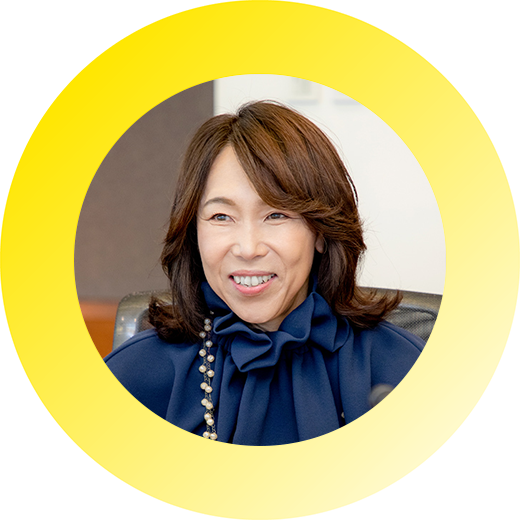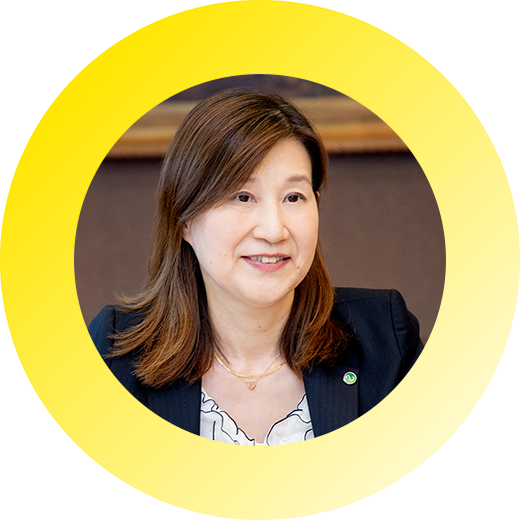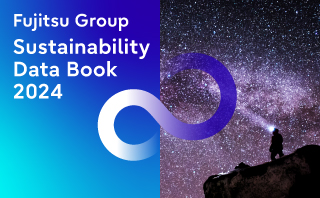-
Sustainability at Fujitsu Group
- Sustainability Management in the Fujitsu Group
- GRB(Global Responsible Business)Goals for FY2025
- GRB(Global Responsible Business)Goals and Achievments for FY2022
- Fujitsu's accessibility
- Stakeholder Engagement
- United Nations Global Compact
- SDG-related Activities in Fujitsu
- External Recognition and Awards
-
Global Responsible Business
- Environment
-
- Environmental Management
- The Fujitsu Group Environmental Vision on Climate Change
- Living in Harmony with Nature (Conservation of Biodiversity)
- Environmental Action Plan
- Environmental Data
- Environmental Communication
- Environmental Social Activities
- Disposal and Recycling of ICT products
- Environmental Considerations in ICT Products
- Governance
-
Data and Documents
- Fujitsu Group Sustainability Data Book 2024
- Social, Governance and Environmental data
- Independent Assurance Report

- GRI Standards / United Nations Global Compact (UNGC) principles Comparison Table
- SASB Standards Comparison Table
- Sustainability Information Disclosure Framework
- Link to regions responsible business reports
- Contact
- Sitemap
Stakeholder Dialogue 2023
Being a Company with Sustainability at the Core of its Business Strategy.

Since 2010, Fujitsu has engaged in dialogues with various external experts in order to reflect stakeholder opinions in management decisions. During the Stakeholder Dialogue held in August 2023, we exchanged views with two experts on the theme of “Being a Company with Sustainability at the Core of its Business Strategy”.
Experts

Akimoto Uchikawa
President and CEO
Representative Director of the Board
Teijin Limited
Joined Teijin Limited in 1990 and in 2017 he was appointed as Corporate Officer, Teijin Group, Responsible for Material Business of Teijin Group and Assistant to the General Manager, Fibers and Products Converting Business Group (for Technology, Production, Restructuring Initiatives). In 2020, he was appointed as General Manager, Composites Business Unit, and then became Executive Officer, Teijin Group and President, Material Business of Teijin Group in April 2021. In June of that year, he became Executive Officer, Member of the Board of Teijin Limited, and was appointed as President and CEO, Representative Director of the Board, Teijin Limited in April 2022.

Shihoko Aoki
Representative,
Wholeness Lab and Senior Research Fellow
The Center for Global Communications (GLOCOM)
Her specialization is in Environmental Studies. After completing the Master 's program in Environmental Systems Science at the Graduate School of Frontier Sciences, the University of Tokyo, she navigated through various roles, including local government officer, NGO staff member, NPO staff member, and university researcher. Since 2021, she has been representing Wholeness Lab, focusing on the quantification of environmental impact (LCA) and crafting next-generation lifestyles. Additionally, she is enrolled in the Doctoral program of Environmental Systems Science at the Graduate School of Frontier Sciences, the University of Tokyo, and serves as a part-time researcher for the non-profit organization Miratsuku.
Fujitsu

Takahito Tokita
Representative Director, CEO

Megumi Shimazu
Corporate Executive Officer, SEVP,
Head of Global Technology Solutions

Yoshinami Takahashi
Corporate Executive Officer, SEVP,
Head of Global Business Solutions

Yumiko Kajiwara
Corporate Executive Officer,
EVP & CSuO
Stakeholder Dialogue (Overview)
Introduction: Self-introductions, Business and Initiatives
Yumiko Kajiwara, CSuO:
As the Chief Sustainability Officer (CSuO), I am responsible for promoting the practice of sustainable management. In order to clarify the issues we should focus on to achieve our Purpose, we revised our Materiality this fiscal year. As Essential Contributions, there are three areas which are “solving global environmental issues”, “developing a digital society”, and “improving people’s well-being”. Furthermore, in the Foundation for Achieving Sustainable Development that supporting our business, we are strengthening “technology”, “management foundation”, and “human capital” as the source of value creation, thereby supporting the creation of new business models and innovations.
Yoshinami Takahashi, SEVP:
I joined Fujitsu in 2021, and have been leading Fujitsu Uvance as head of the Global Solutions Business Group since this fiscal year. We are taking a cross-industry approach to resolving societal issues by rolling out global solutions and services that link different industries together. Fujitsu is promoting co-creation business with customers around the world. One such business involves joint trials with Teijin to increase the environmental value of recycled resources. In the future, we plan to roll out ESG management platforms and aim to reduce greenhouse gas (GHG) emissions by building a circular economy through simulations and visualization up to Scope 3, together with recommendations that employ AI and blockchain technology.
Megumi Shimazu, SEVP:
After joining the company, I worked as a systems engineer building systems for customers. Since 2015, I have been responsible for cloud services network services, datacenter services, managed infrastructure services and service desk, and global service delivery. Since 2022, I am based in the UK and promoting Fujitsu Uvance Horizontal areas. I see security threats, geopolitical risks, business risks associated with growing global ecosystems, developing capability for growth areas and cutting-edge technology, building common understanding of corporate strategy, action and governance, and establishment of the platform that enable us data-driven management are the themes we need to work with to drive our transformation and businesses.
Akimoto Uchikawa, Teijin Limited:
I was appointed as President and CEO, Representative Director of the Board, Teijin Ltd. in 2022. Teijin began as a commercial manufacturer of rayon and has since expanded to now encompass a wide range of materials, fibers and products converting, as well as healthcare businesses. Through our sustainability initiatives, our goal is to be a Company that Supports the Society of the Future by promoting “environmental value solutions”, “safety, security and disaster mitigation solutions”, and “demographic change and increased health consciousness solutions” in our businesses. We are proceeding business innovation through high value-added applications based on multi-materials that leverage the capabilities of high-performance materials, and developing new solutions from sustainability that reduce environmental impacts through our entire supply chain to realization of regeneration. The aim of our project of trials to enhance the environmental value of recycled resources is to create a circular economy starting from the material industry and to encourage the widespread uptake of reliable recyclable materials. In future, we will further expand the scope of these trials.
Shihoko Aoki, Wholeness Lab:
My specialty is environmental studies and I have worked in regional local government and in NPOs. I’m currently supporting and conducting research into topics ranging from the quantification of environmental impacts (LCA*1) through to new business opportunities for companies. I think there are three essential elements of sustainability that we need to be aware of, understand and demonstrate: (1) active and passive approaches that use LCA-based measurement; (2) Pursuit of not only "efficiency" and "dematerialization" but also "sufficiency”*2; and (3) each individual’s personal environment (or Umwelt) *3. Sustainability encompasses not only the environment, but also communities and human rights, and the trend towards including these as evaluation criteria is likely to increase in future. Based on this, and also from the perspective of DE&I, the key is to take a multi-layered approach to the environment. As a company, we respect the views of our various employees. So, by leveraging the ways in which our employees experience the world, we may be able to take the lead in innovation creation.
- *1The quantitative assessment of the environmental impacts and effects of products and services throughout their entire life cycle, from gathering the raw materials through to materials handling, product manufacturing, transportation, use, disposal and recycling.
(Reference: “LIME 2: Environmental Impact Assessment Methodology to Support Decision-Making", Japan Environmental Management Association for Industry JEMAI); “From Considerations of LCA Life Cycles Learned Through Practice to Practical LCA Application”, CAT Corporation.) - *2The consumption of a sufficient and appropriate amount of physical materials and services necessary for optimal health and happiness.
(Reference: P-M. Boulanger, 2010 “Three strategies for sustainable consumption”) - *3A biological concept describing the way that animals only experience universal time and space in terms of their own individual time and space.
(Reference: “A Stroll Through the Worlds of Animals and Men”, Jakob von Uexküll)
Sustainability from the viewpoint of Sufficiency
Takahashi:
With regards to the sufficiency strategy, can you suggest a more specific approach that companies should take when considering economic rationality?
Aoki:
Sufficiency is the concept that economic development and consumption should be sufficient for people’s well-being. To take "mobility" as an example, in the Netherlands, while questioning the necessity of mobility, the city is being developed for walking after considering the advantages and benefits of walking rather than driving. We need a perspective that changes from the consumer's sense of value.
Tokita:
A sufficiency strategy needs to consider national and regional customs and ethics. As a global company, it is difficult to develop a company-wide strategy because customs and ethics differ in each country. On the other hand, the commercialization of sustainability requires scale, and I believe it is important to be able to connect with others in a circle of empathy and promote sustainability on a global scale.

Uchikawa:
Our company aims to achieve sustainability in the chemical industry by striking a balance between environmental impact and recycling. However, due to differences in customs and ethics between countries, we have not yet come to recognize the importance of the recycling business together with chemical manufacturers in Europe and the US. So, it is difficult for us, as a single company, to establish a sustainable ecosystem.
Data Visualization to Promote Sustainability
Tokita:
We all recognize that urgent action is needed to address climate change worldwide. However, the reality is that for many countries there are higher priority issues such as healthcare, water security and the growing gap between rich and poor. The countries referred to as the global south are an example of this. Each of the 17 goals of the SDGs can be a trade-off, so we must always consider what is really best for the world and what the true aims of the SDGs are.
Shimazu:
There are various viewpoints on sustainability, and I think there is no one corporate approach that is going to be correct for everyone. The impact of using paper straws instead of plastic straws give to the global environment may be large according to one viewpoint, or small according to another, as Aoki-san pointed out. But when a company is deciding which to use, the choice of which viewpoint to take as the basis for their decision is important.

Aoki:
As you rightly pointed out, incorporating quantification through Life Cycle Assessment (LCA) and adopting guiding principles in driving initiatives are essential. Paper straws, at first glance, seem environmentally considerate due to their natural material. However, they may possess aspects that actually result in a substantial environmental impact, reminding us that we, too, might unknowingly be engaged in 'sustainability washing'.
Uchikawa:
I agree. Rather than simply focusing on the actual SDGs themselves, I believe it is important for companies who committed to them to clearly state how they are going to apply themselves to changes in the rules and priorities, from a range of perspectives. Data visualization, such as that offered by co-creation business ventures with Fujitsu, plays an important role in deciding what companies should focus their efforts on, especially when there are various different evaluation criteria for environmental issues. I expect ICT solutions to be implemented so that no one is left behind.
Tokita:
In terms of their expectations of Fujitsu, some academics have approached us wanting to use our Digital Twin technology to simulate the entire ocean on Earth. I believe that it will be difficult to develop rules and evaluation criteria for promoting the SDGs if we can’t reproduce the entire planet in cyberspace and run simulations of policy measures. Putting aside the question of whether this can be achieved quickly, enabling such simulations is our mission as a DX company.
Uchikawa:
With its cutting-edge technology and commitment to sustainability, I would expect Fujitsu to lead the way. Chemical manufacturers and other companies can only ever work on the application side of this issue, so we would be hoping to see Fujitsu establish a shared platform after agreeing on how to use the data, so that many companies can adopt it.
Tokita:
This is predicated on how many customer applications would run on the platform. Global issues require cross-industry approach, and whether or not they are placed on our platform, we feel the need to utilize common data across all industries, create or collect data using common rules, and analyze and disclose it using the same methods.
Takahashi:
In order to collect, analyze and present data using shared rules, we need to work together to create an ecosystem. At Fujitsu, we propose this approach to many of our customers on a daily basis. For customers that find it difficult to achieve internal consensus, we visit each department together and explain the importance of using data.
Aoki:
Data disclosure and sharing is also important for LCA. However, companies often find it difficult to share core technical information when that information is used to run their business. I hope that the momentum of data sharing between companies will increase as we move forward with a shared purpose.
Tokita:
At the Davos Forum held in January this year, a session attended by executives from about 20 global IT companies suggested that we compare and contrast regulations in different countries and discuss how common rules and platforms across countries should be. I believe that, by focusing on corporate responsibility, it is not impossible for private companies to work together to address this issue. By stepping beyond the constraints of competitiveness, I believe that this movement will accelerate as we are able to look at how stepping away from the ties of being a source of competition will expand opportunities in each company and lead to increased corporate value and reputation.

The Need for Diversity
Tokita:
Promoting our business from all perspectives while ensuring diversity is exactly what we aim for in sustainability management. I feel that it is necessary to disclose sustainability initiatives, including the concept of LCA, in communication among companies. On the other hand, reality cannot be ignored in corporate management. While we cannot pursue only our ideals, we must firmly focus on how to achieve our purpose from a management perspective. As a technology company, the goal of recreating the entire planet in cyberspace, as discussed earlier, is a huge engineering challenge. But if we move forward with this aim in mind, we can somehow contribute to everyone's needs.
Shimazu:
While allowing each company to take diversity into account, I think that sharing the values that companies and society have will help us to create a collective ecosystem that will bring together companies, organizations and nations who emphasizes with those values. Certainly, when we can work with customers like Teijin who are putting into practice a vision for achieving regeneration, that will surely accelerate the progress towards sustainability.
Uchikawa:
To achieve sustainability, people with a shared corporate purpose and orientation towards resolving issues must come together. I feel that the concept of "each individual’s personal environment" is essential for motivating companies themselves. When we are trying to work with companies that are tackling societal issues around the world, we will inevitably choose those companies who have been able to disclose that fact.

Conclusion
Kajiwara:
Thank you all for making today’s discussion so rewarding. Uchikawa-san shared his unique experience and knowledge with us, focusing on both business and sustainability, while Aoki-san shared very suggestive opinions such as what it is to be sustainable and the importance of measuring environmental impacts using tools such as LCA. These were
a great learning experience for our company. Finally, I would like to ask for final comments from Uchikawa-san and Aoki-san, including your expectations with regard to Fujitsu.
Uchikawa:
I look forward to seeing Fujitsu using its advanced technology to build cross-industry ICT platforms to ensure that no one is left behind, which is the goal of the SDGs. With the aim of collaborating more closely with Fujitsu, our company also hopes to build a range of applications.
Aoki:
With its diverse workforce, I hope to see Fujitsu leverage its innovations and technology to achieve a more enriched and sustainable world.
Tokita:
The views and perspectives expressed by Uchikawa-san and Aoki-san offer very insightful opinions. At the forefront of our company’s Fujitsu Way values is “Inspiration”. For Fujitsu, “Inspiration” relies heavily on gaining “Trust”, and growing together with companies we endorse, while remaining trustworthy. We will expand our circle of empathy and make the world more sustainable. I feel certain that through dialogue with stakeholders, this circle will be further widened.
We will apply the suggestions and expectations of both of you in our ongoing management at Fujitsu.
Thank you both so much for your valuable opinions today.


